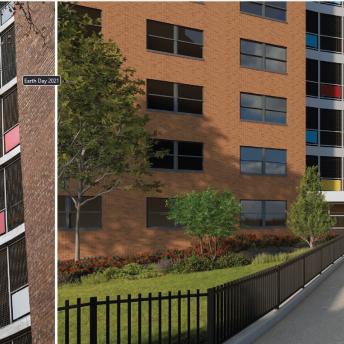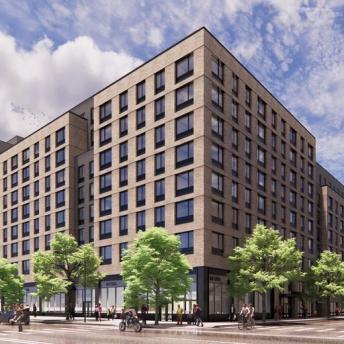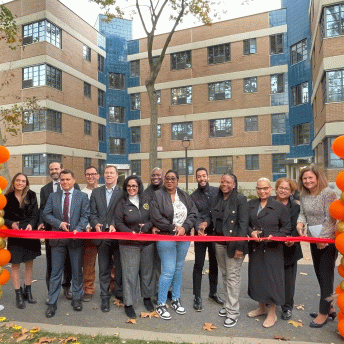NYC Housing Preservation and Development (HPD) Commissioner Mathew M. Wambua, New York City Housing Development Corporation (HDC) President Marc Jahr, City Council Speaker Christine C. Quinn, Workforce Housing Advisors (WFHA), Morgan Stanley, JP Morgan Chase and partners today announced the beginning of what will be a substantial renovation of four of the most physically distressed multi-family buildings in the City. The buildings, which are located at 2239, 2241, 2323 and 2333 Creston Avenue in the University Heights section of the Bronx have a combined 120 apartments. The previous owner allowed the properties to slide into such a deplorable state that all four were placed in HPD’s Alternative Enforcement Program (AEP), an initiative that annually targets the 200 most distressed buildings in the City for remediation. This public-private partnership will put a financing plan in place to bring the Creston Avenue buildings back into good repair and ensure that the tenants’ homes are safe, stable and affordable for the long-term.
The preservation of the Creston Avenue buildings is part of Mayor Michael R. Bloomberg’s New Housing Marketplace Plan (NHMP), a multibillion dollar initiative to finance 165,000 units of affordable housing for half a million New Yorkers by the close of the 2014 fiscal year. For every dollar invested by the City, the Plan has leveraged $3.43 in additional funding for a total commitment of more than $21 billion. To date, the NHMP has funded the creation or preservation of more than 147,893 units of affordable housing across the five boroughs. More than 45,186 units have been created or preserved in the Bronx with more than 4,576 of those units in Bronx Community Board 5.
“The residents of these buildings have suffered at the hands of a negligent landlord for too long. The tenants deserve to feel secure in their homes and to know that a new owner will have the resources to bring these buildings back into good repair. We’ve shown our commitment to these families by making tens of thousands of dollars in emergency repairs through our Alternative Enforcement Program,” said HPD Commissioner Mathew Wambua. “I thank the HPD staff for their tireless efforts with regard to the physical and financial health of these properties when the neglectful former owner failed to do so and I am thrilled that WorkForce Housing Advisors will now step in and be the saving grace these tenants need. I want to thank Speaker Quinn, Morgan Stanley, JP Morgan Chase and all of our partners, without whom this good work could not be done.”
“The preservation of four distressed Creston Avenue homes shows what it is possible when tenants, organizers, banks, developers and the City work together to bring positive changes to their communities,” said Speaker Christine C. Quinn. “Thanks to the hard work of HPD, numerous stakeholders and the Council’s Safe Housing Act, tenants will no long suffer at the hands of a negligent landlord. I thank Council Member Cabrera, UHAB, and especially the tenants for their relentless organizing and perseverance and HPD, HDC, Workforce Housing Advisors, Morgan Stanley, and JP Morgan for bringing this rehabilitation to fruition.”
"This is about preserving affordable housing for the next generation of families. Every preservation deal brings new life to aging buildings and a guarantee of continued affordability for tenants,” said Marc Jahr, President of HDC. “Communities of this great City are being strengthened due to the New Housing Marketplace Plan. Every collaboration, every partnership and every deal helps to ensure that we are doing everything we can to make New York City more affordable. I would like to thank our partners in the public and private sector who all work very hard towards the same common goal and made this deal come to fruition.”
The four buildings were built between 1915 and 1927 and are comprised of 120 residential units and two superintendent units. By the time WHFA received ownership of the four Creston Avenue buildings in April 2012, the previous ownership had allowed the properties to accrue over 1,000 hazardous and immediately hazardous housing code violations requiring all four buildings to be placed in AEP. Absent AEP, the properties would have continued to rapidly deteriorate and pose a health and safety risk to the tenants and may have threatened the stability and integrity of the surrounding neighborhood.
The AEP allowed HPD to target these properties, do roof-to-cellar inspections, order the replacement of major buildings systems, and perform more than $40,000 in emergency repairs to the most hazardous conditions which the old owner refused to address. With the transfer of ownership to WHFA, and a fully funded public-private renovation plan now in place, the City will no longer need to intervene on emergency repairs and the current tenants can begin to look forward to responsive management and the promise of newly renovated homes.
“The Creston Avenue project represents another example of innovative problem solving by a group of organizations coming together to improve a troubled development, “said John Crotty. “This program didn’t exist 4 years ago and now we have taken the collaboration to so many talented partners to help scores of families living in deplorable conditions. We commend and thank our private, public and not-for-profit partners for making this transaction happen.”
The partnership between Workforce Housing Advisors and Morgan Stanley helped provide the resources to maintain these four buildings in the Bronx until renovations could begin this summer. The conditions require considerable physical upgrades including the installation of a new roof, new windows, new electric systems, new plumbing, new heating plants and distribution systems. The properties also require updates to the kitchens and bathrooms. Construction will take place in two phases over the span of 18 months and WFHA has provided for the temporary relocation of the tenants during the construction period. Morgan Stanley provided the funds necessary to secure the acquisition and pay off the municipal charges on this portfolio and then made further long-term investments.
City Council support for these buildings, through Reso-A funding and Article XI tax exemption, is part of the Council’s Task Force on Financially Distressed Rental Housing. The Task Force brings together advocates and experts to find policy solutions for the overleveraged multifamily housing crisis and identifies buildings that need attention.
The Task Force has collaborated on solutions like the Proactive Preservation Program and passed legislation giving HPD the ability to issues orders to correct major systems and underlying conditions and legislation requiring notification to HPD of the commencement of foreclosures. The Task Force has also advocated on behalf of buildings in the Bronx, Manhattan, and Brooklyn.
“The renovation of these four buildings represents the kind of aggressive action which will be required if we are to restore our most distressed housing stock to livable condition,” said Council Member Fernando Cabrera.
The total cost of this rehabilitation project is approximately $28.6 million. HPD is providing a $7.7 million loan through the 421a Fund during construction, which will increase to a total $10.9 million loan following the completion of construction and conversion to permanent financing. The City Council provided $1.5 million in Reso-A funding toward the project. HDC is providing $14.2 million in tax exempt bonds during construction, allowing the project to generate 4% Low Income Housing Tax Credits underwritten by the National Equity Fund (NEF). Prior to the commencement of construction, HPD and the City Council worked to facilitate an Article XI tax exemption, which will help defray long-term costs and thus help to subsidize the long-term affordability of the low-income apartments. JP Morgan Chase and Morgan Stanley are the Letter of Credit Providers.
“We are committed to supporting affordable housing in our communities,” said Audrey Choi, Managing Director and Head of Global Sustainable Finance at Morgan Stanley. “The renovation of these four buildings is an opportunity to greatly improve the living conditions of the families and individuals who reside there.”
“The improvement of housing conditions helps create a foundation for the safety and revitalization of communities. As we continue to help stabilize Bronx neighborhoods by investing in redevelopment projects and partnering with community organizations, the Creston Ave project provides a better and healthier living environment for families in University Heights,” said Priscilla Almodovar, head of Chase’s Community Development Banking.
“At National Equity Fund, we believe that extraordinary things happen when you have great partners and this project is evidence of that conviction,” commented Joe Hagan, president and CEO of NEF. “With Workforce Housing Advisors’ commitment to finding the most equitable solution for these properties and their residents and Morgan Stanley’s financial backing allowing for that solution to become realty, it would be hard to find two better partners for this project,” he added.
“Tenants in these buildings have suffered for years due to owners like Alan Fein who speculate on affordable housing,” said Kerri White Director of Organizing and Policy at UHAB. “When the residents at 2239 & 2241 Creston Ave began organizing, their homes were in foreclosure and the already poor conditions began declining rapidly. This struggle mirrors that of so many other tenants throughout the city where financial recklessness has led to massive deterioration in buildings across the city. This deal demonstrates the only way to counter predatory lending on distressed housing: to implement a plan that includes the intensive repairs the buildings need, while ensuring that the future debt will be sustainable at rents the tenants can afford.”
Immediately upon taking title to the properties, WFHA began a dialogue with the tenants and the Urban Homesteading Assistance Board (UHAB), a tenant advocacy group who had been working to organize the tenants for some time. UHAB counseled the tenants through the transfer period and continues to work with WFHA to maintain an open line of communication with tenants at the properties.
Upon completion of the renovations there will be forty-one vacant units available to families earning no more than 60% Area Median Income (AMI), or the equivalent of an annual household income of $51,540 for a family of four. AMI levels are determined yearly by the U.S. Department of Housing and Urban Development (HUD). The City of New York requires that subsidized apartments be rented through an open lottery system to ensure fair and equitable distribution of housing to eligible applicants. Marketing of the apartments and the application process for the lottery typically begin when construction is approximately 70 percent complete. For more information regarding the lottery process, current housing lotteries, how to apply to an open lottery, and if you would like to receive an e-mail when HPD updates its available apartment and home website listings for City-subsidized housing in the five boroughs, please visit the Apartment Seekers and Homebuyers pages at www.nyc.gov/hpd.
These buildings are a continuation of WFHA’s business plan to repurpose distressed multifamily buildings in New York City to help create change where it is most needed.
Photos of the units can be found here: http://wfhadvisors.com/wfh/projects/cresTon/cresTon_2.html
NYC Department of Housing Preservation and Development (HPD)
HPD is the nation’s largest municipal housing preservation and development agency. Its mission is to promote quality housing and viable neighborhoods for New Yorkers through education, outreach, loan and development programs and enforcement of housing quality standards. It is responsible for implementing Mayor Bloomberg’s New Housing Marketplace Plan to finance the construction or preservation of 165,000 units of affordable housing by 2014. Since the plan’s inception, more than 147,890 affordable homes have been created or preserved. For regular updates on news and services, connect with us via www.facebook.com/nychpd and www.twitter.com/nychousing. For more information, visit our website at www.nyc.gov/hpd.
About NYC Housing Development Corporation (HDC)
Since 2000, HDC has issued roughly 10% of all the multi-family housing revenue bonds in the U.S. and since 2003, when Mayor Bloomberg’s New Housing Marketplace Plan was launched, HDC has raised more than $6.7 billion in financing for affordable housing developments, including in excess of $1 billion in subsidy from corporate reserves. To date, under the Mayor’s plan, HDC has financed the creation or preservation of more than 70,628 of the total 147,890 affordable units in multifamily buildings financed to date. HDC also financed the creation 1.7 million square feet of commercial space. For additional information, visit: www.nychdc.com
Workforce Housing Advisors (WFHA)
WFHA is a for profit affordable housing development firm that specializes in re-purposing distressed multifamily real estate in the New York metropolitan area. WFHA works collaboratively with for-profit, not-for-profit, and government partners to reposition financially and physically distressed properties as long term affordable housing resources. http://www.wfhadvisors.com
Urban Homesteading Assistance Board (UHAB)
UHAB is a non-profit organization which provides low-income residents with the training and support services they need to sustain their homes with an emphasis on using the self-help housing process as a catalyst for leadership development and broader community change. The majority over our 40 year history has focused on creating and preserving over 30,000 units of high quality housing co-operatives throughout New York City. UHAB’s Organizing and Policy department focuses on empowering residents in rent regulated and subsidized buildings to create tenant associations to advocate for the protection of affordability, to fight for safe, decent living conditions, and to foster preservation-friendly policy changes at the local, state, and national level.


